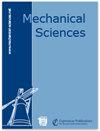三元动力减振器参数优化的自适应多温暖粒子群算法
IF 1.5
4区 工程技术
Q4 ENGINEERING, MECHANICAL
引用次数: 2
摘要
摘要动态减振器(DVA)参数的可靠优化对于分析其动态阻尼特性和提高其减振性能至关重要。在本文中,我们将根据H∞优化准则讨论Voigt和三元DVA模型的参数优化方法。粒子群优化方法是一种有效的启发式优化算法;然而,它很容易失去多样性,陷入局部极值。为了解决这个问题,使用自适应多温暖粒子群优化(AM-PSO)来搜索DVA模型的解。将AM-PSO中的粒子自适应地划分为多个群,并采用可变替换学习策略来降低其计算复杂度,提高算法的全局搜索能力。此外,采用AM-PSO方法对DVA模型的参数进行了优化,并与遗传算法和粒子群算法进行了比较。仿真结果表明,AM-PSO算法具有优越的性能。此外,本文讨论的自适应多温数值设计方法将推动该领域的实际应用,包括传统的DVA和相关的复杂三元DVA。本文章由计算机程序翻译,如有差异,请以英文原文为准。
Adaptive multiswarm particle swarm optimization for tuning the parameter optimization of a three-element dynamic vibration absorber
Abstract. A reliable optimization of dynamic vibration absorber (DVA) parameters is extremely important to analyze its dynamic damping characteristics and improve its vibration suppression performance. In this paper, we will discuss a parameter optimization method of the Voigt and three-element DVA models according to the H∞ optimization criterion. The particle swarm optimization method is an effective heuristic
optimization algorithm; however, it is easy to lose diversity and fall into local extremum. To solve this problem, the adaptive multiswarm particle swarm optimization (AM-PSO) is used to search the solution of the DVA models. Particles in AM-PSO are adaptively divided into multiple swarms, and
the variable substitution learning strategy is utilized to reduce their computational complexity and improve the algorithm's global search capability. In addition, the AM-PSO method is employed to optimize the parameters of DVA models and compared with the genetic algorithm and PSO. The simulation results show that the AM-PSO algorithm has superior performance. Also, the adaptive multiswarm numerical design method discussed herein will push the field towards practical applications, including traditional DVA and related complex three-element DVA.
求助全文
通过发布文献求助,成功后即可免费获取论文全文。
去求助
来源期刊

Mechanical Sciences
ENGINEERING, MECHANICAL-
CiteScore
2.20
自引率
7.10%
发文量
74
审稿时长
29 weeks
期刊介绍:
The journal Mechanical Sciences (MS) is an international forum for the dissemination of original contributions in the field of theoretical and applied mechanics. Its main ambition is to provide a platform for young researchers to build up a portfolio of high-quality peer-reviewed journal articles. To this end we employ an open-access publication model with moderate page charges, aiming for fast publication and great citation opportunities. A large board of reputable editors makes this possible. The journal will also publish special issues dealing with the current state of the art and future research directions in mechanical sciences. While in-depth research articles are preferred, review articles and short communications will also be considered. We intend and believe to provide a means of publication which complements established journals in the field.
 求助内容:
求助内容: 应助结果提醒方式:
应助结果提醒方式:


